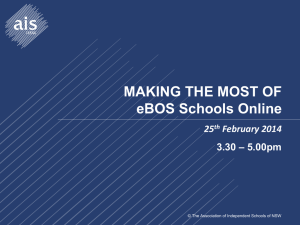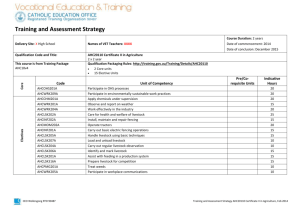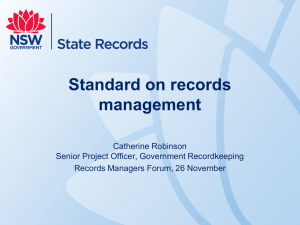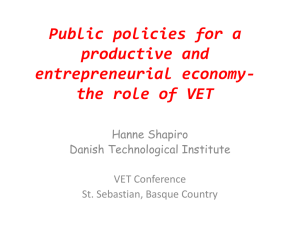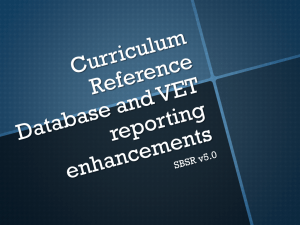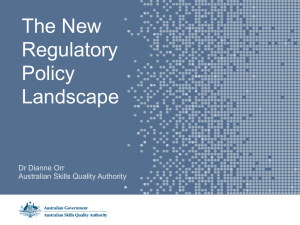Session 2 Self Assessment - Association of Independent Schools of
advertisement
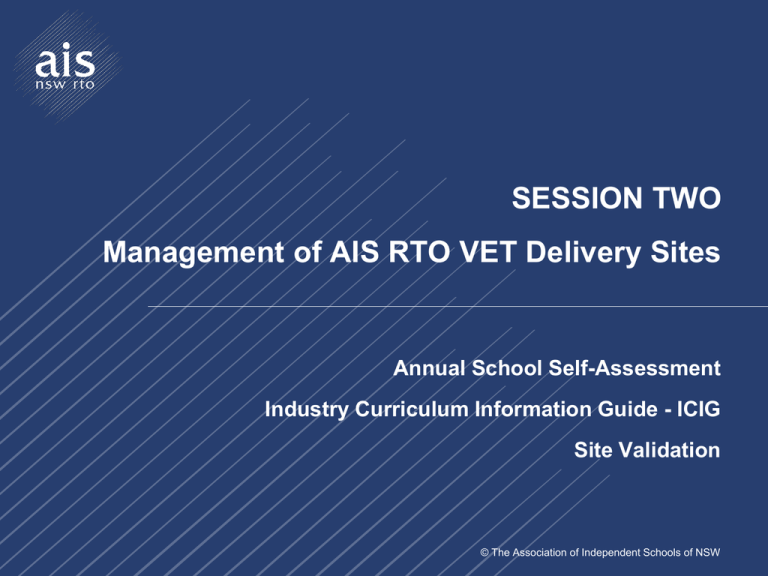
SESSION TWO Management of AIS RTO VET Delivery Sites Annual School Self-Assessment Industry Curriculum Information Guide - ICIG Site Validation © The Association of Independent Schools of NSW ICIG School Self Assessments Site Validation Visitations School Consultation Visits © The Association of Independent Schools of NSW The AIS RTO has developed a number of processes which aim to assess the current conditions and standards of VET Delivery across the RTO and provide a mechanism for continual improvement. SCHOOL SELF ASSESSMENT What is the same? What is different? Modelled on the standards with evidence embedded Annual Assessment - Due Date: April 11th 2014 Basis for VETiS Funding - $200 Action Plan © The Association of Independent Schools of NSW SITE VALIDATION VISITATIONS A member of the AIS RTO team undertakes site validation visits at selected schools each year to formally review VET delivery 10 – 12 schools annually Within two weeks of a site validation visit a feedback report is provided to the principal. © The Association of Independent Schools of NSW SCHOOL CONSULTATION VISITS The AIS VET consultants work closely with schools across a range of areas such as new courses, student enrolments and teachers delivering VET. Approximately 2- 3 visits a year Network meetings and course specific validation meetings © The Association of Independent Schools of NSW ICIG - Industry Curriculum Information Guide Due Date: April 11th 2014 Schools complete an annual Industry Curriculum Implementation Guides (ICIG) for each vocational course being delivered. Checklist for managing access to the required resources – ‘Onsite/ Off site’ © The Association of Independent Schools of NSW Self - Assessment Tool http://www.surveygizmo.com/s3/1530488/2014-AIS-RTO-SCHOOL-Self-Assessment-Report © The Association of Independent Schools of NSW LINK to Self - Assessment Tool © The Association of Independent Schools of NSW Group 1. SNR 15 The RTO provides quality training and assessment across all of its operations, as follows: Based on the school evidence reviewed; identify areas for improvement and how these improvements will be actioned. EVIDENCED AT SCHOOL LEVEL Course evaluations are completed by students. Yes/ No School provides opportunities for parents and employers to provide feedback. Yes/ No 1. Outline the strategies that the school could undertake to improve data collection and analysis. What do you do with information? 15.1 The RTO collects, analyses, and acts on relevant data for continuous Schools complete Learner and Employer Satisfaction Surveys and/or Destination surveys Yes/ No The school analyses eBOS data including evaluation of completion and noncompletion rates. Yes/ No School reviews the previous year’s action plan and amends the continuous improvement register. Yes/ No The School implements action arising from VET meeting. Yes/ No improvement of training and assessment. CONTINUOUS IMPROVEMENT © The Association of Independent Schools of NSW Group 2. 2. The school uses of AIS RTO Training and Assessment Strategies (TAS) and Assessment plan for each course delivery at the school site. Yes/ No What would you need to do if your school has decided to implement an alternate AIS RTO TAS? 15.2 Strategies for training and TAS assessment meet the requirements of the relevant Training Package or VET accredited course and have been developed through effective consultation The school uses the AIS RTO approved school developed TAS, reflecting local needs and effective consultation with industry Yes/ No The school retains evidence of local industry input is evident in the TAS. Yes/ No with industry. STRATEGIES FOR TRAINING AND ASSESSMENT © The Association of Independent Schools of NSW TAS – Training and Assessment Strategy © The Association of Independent Schools of NSW Group 3. 15.3 Staff, facilities, equipment and training and assessment materials used by the RTO are consistent with the requirements of the Training Package or VET accredited course and the RTO’s own training and assessment strategies and are developed through effective consultation with industry STAFF, FACILITIES, EQUIPMENT AND TRAINING AND ASSESSMENT MATERIALS All VET Teachers that are delivering training and assessment hold the most current qualifications Yes/ No Where a new teacher is undertaking VET training and delivering, the school has Implemented a ‘Working under supervision agreement’. Yes/ No/ NA 3. your school had a new teacher to VET and One The school ensures VET teachers have uploaded their qualifications details and evidence – Certified Testamur on the VET Teacher Database Yes/ No The school ensures VET teachers maintain VET industry currency and update a Professional Development Log annually. Yes/ No The school completes Industry Curriculum Information Guides (ICIG) for each VET qualification delivered. Yes/ No School safety protocols are consistent with those identified in the relevant training package. Eg; SDI (Safety Data Information), OnGuard, SOP (Standard Operation Procedures) Yes/ No A MOU/letter of agreement is in place outlining external access to facilities when adequate facilities are not available at the school delivery site. that required upgrading of their qualifications. ICIG Yes/ No/NA Industry relevant support materials and resources are used in the delivery of the qualification. Yes/ No The school undertakes risk assessments of internal and external environments. Yes/ No © The Association of Independent Schools of NSW Explain the process that would need to follow if ICIG © The Association of Independent Schools of NSW ICIG © The Association of Independent Schools of NSW AHC20410 Certificate II in Horticulture the RTO training and assessment strategy, developed using appropriate assessment tools to allow students to properly demonstrate achievement of units of competency, is being implemented and students have been informed of the assessment for the qualification they are currently undertaking. information on intended qualifications, units of competency to be delivered and units of competency achieved is being progressively entered into eBOS-VCS via Schools Online in accordance with the timeline advised by the NSW Board of Studies. ICIG © The Association of Independent Schools of NSW Group 4. 15.4 Training and assessment is 4. delivered by trainers and assessors who: a) have the necessary training and Suggest a model for schools to adopt to ensure assessment competencies as VET teachers engage in regular meetings and determined by the National Quality Council or its successors and b) The school provides opportunities to participate in VET network meetings. Yes/ No have the relevant vocational Include a list of suitable professional activities competencies at least to the level that would assist VET teachers in maintaining being delivered or assessed and c) their industry currency. can demonstrate current industry skills directly relevant to the training/assessment being undertaken and d) continue to develop their vocational education and training (VET) knowledge and skills as well network sessions. School processes are followed to confirm certifications required under licensing requirements, eg; police /working with children checks, white card (WHS card), etc as their industry currency and trainer/assessor competence. TRAINER COMPETENCE © The Association of Independent Schools of NSW Yes/ No Group 5. An assessment plan is developed for each VET qualification being delivered. 15.5 Assessment including Recognition Assessment Task notifications are developed for all assessment tasks/instruments. Yes/ No 5. Yes/ No of Prior Learning (RPL): a) meets the requirements of the What would a school need to do to ensure tasks Assessment Tasks are mapped against performance criteria and required skills & knowledge. Yes/ No relevant Training Package or VET accredited course b) What can the school do to establish benchmark Benchmark responses are established for all assessment tasks/instruments. Yes/ No Competency records are maintained for each cohort. Yes/ No the rules of evidence Validation Dates meets workplace and, where relevant, regulatory requirements A systematic process of Assessment Validation is in place Yes/ No A systematic process of Assessment Moderation is in place Yes/ No The school has policies and procedure for RPL and CT (Credit Transfer) Yes/ No The school maintains RPL and CT Register Yes/ No and d) responses for each task? is conducted in accordance with the principles of assessment and c) are mapped against performance criteria? is systematically validated. ASSESSMENT & RPL © The Association of Independent Schools of NSW © The Association of Independent Schools of NSW Validation © The Association of Independent Schools of NSW Validation Dates Schedule of AIS RTO Assessment Tasks Validation and Moderation Workshops 2014 Workshop Date Time Venue Newington College Construction 13th/14th May 9.00am - 4pm 200 Stanmore Rd, Stanmore Trinity Grammar Entertainment 15th /16th May 9.00am – 4pm 119 Prospect Road, Summer Hill Information and Trinity Grammar 15th /16th May 9.00am - 4pm Digital Technology 119 Prospect Road, Summer Hill Trinity Grammar Primary Industries 15th /16th May 9.00am – 4pm 119 Prospect Road, Summer Hill Trinity Grammar Electrotechnology 15th /16th May 9.00am – 4pm 119 Prospect Road, Summer Hill © The Association of Independent Schools of NSW Group 6. SNR 16 The RTO adheres to principles of access and equity and maximises outcome for its clients, as follows: Based on the school evidence reviewed; identify areas for improvement and how these improvements will be actioned. EVIDENCED AT SCHOOL LEVEL The school has enrolment and subject selection procedures in place. Yes/ No The school uses student profile information and careers counselling to identify VET delivery options that will best met student needs. Yes/ No 6. Outline a process for providing VET Course information and counselling to students? 16.1 The RTO establishes the needs of clients, and delivers services to meet these needs. ESTABLISHING THE NEEDS OF CLIENTS 16.2 The RTO continuously improves client services by collecting, analysing and acting on relevant data. Refer to SNR 15.1 The school considers local and industry in considering VET delivery options. Yes/ No In supporting School Based Apprentices or Trainees the school liaises with the Apprenticeship Centre, employer and RTO as appropriate. Yes/ No/NA The school has mentoring and management processes for the School Based Apprentice or Trainee SBAT. Yes/ No/NA The school conducts a work readiness program prior to work placement Yes/ No The services of the WPSP (Work Placement service Provider) are used as appropriate. Yes/ No The school acts on data collected and client feedback to improve VET delivery. Yes/ No CONTINUOUS IMPROVEMENT © The Association of Independent Schools of NSW How do you manage and support a SBAT Students in your school. What are the key improvements that could be made? Group 7. 16.3 Before clients enrol or enter into an agreement, the RTO informs them about The school provides subject selection handbooks and/ or VET Course Information Flyers. Yes/ No 7. the training, assessment and support services to be provided, and about their rights and obligations. How can the School VET Handbook be improved The school provides VET Course Assessment information, for example; Competency Based Assessment, RPL and Complaints and Appeals. Yes/ No The school provides the employer with the Guide to workplace learning. Yes/ No The school receives an employer work placement report for each student. Yes/ No The school provides a work placement journal for each course delivered. Yes/ No The school engages in Work Placement visitation Yes/ No Where the AIS is the RTO for school based apprentices and trainees the school provides regular feedback to the employer in regards to areas such as; student competency achievement and VTO requirements. Yes/ No/ NA to meet the rights and obligations of the client. (Student) RIGHTS AND OBLIGATIONS 16.4 Employers and other parties who contribute to each learner’s training and What are the expectations for work placement and assessment are engaged in the development, delivery and monitoring of training and assessment. EMPLOYERS AND OTHER PARTIES © The Association of Independent Schools of NSW visitations? Group 8. The school provides student /parent /employer guides to workplace learning. Yes/ No Reasonable adjustments are made to support students with special needs, eg; IEP (Individual Education Plan) Yes/ No Specialist support for LLN (Language, Literacy and Numeracy) & special needs is accessed as appropriate. Yes/ No Feedback and assessment results are provided for each assessment task. Yes/ No School reports reflect the achievement of units of competency for the qualification. Yes/ No 16.5 Learners receive training, 8. assessment and support services that meet their individual needs. What types of improvements could be made to better support students with special needs. SUPPORT SERVICES 16.6 Learners have timely access to current and accurate records of their participation and progress. LEARNERS ACCESS TO RECORDS 16.7 The RTO provides appropriate The school has an appropriate complaints and appeals process Yes/ No mechanisms and services for learners to have complaints and appeals addressed efficiently and effectively. The school maintains an evidence register of complaints and appeals. COMPLAINTS AND APPEALS © The Association of Independent Schools of NSW Yes/ No Group 9. SNR 17 Management systems are responsive to the needs of clients, staff and stakeholders, and the environment in which the RTO operates, as follows 17.1 The RTO’s management of its Based on the school evidence reviewed; identify areas for improvement and how these improvements will be actioned. EVIDENCED AT SCHOOL LEVEL The AIS RTO and the school have a current signed MOU. Yes/ No 9. operations ensures clients receive the Who has the responsibility for data collection and services detailed in their agreement with the RTO. The school has a clearly defined VET management structure. Yes/ No MOU accuracy within the school? An external MOU is established when training ORGANISATION'S MANAGEMENT Regular VET meetings are held and agenda and minutes retained. services are sourced outside the school /RTO. Yes/ No What issues should this external MOU address? 17.2 The RTO uses a systematic and continuous improvement approach to the management of operations. Refer to SNR Yes/ No 15.1 CONTINUOUS IMPROVEMENT 17.3 The RTO monitors training and/or assessment services provided on its behalf to ensure that it complies with all aspects of the VET Quality Framework The school has MOU/letter outlining services provided under a partnership arrangement by another RTO or external provider. Eg; White card, Espresso coffee and joint delivery. PARTNERSHIPS. © The Association of Independent Schools of NSW Yes/ No Group 10. The school undertakes reliable and timely procedures for the transfer of enrolment and assessment data -eBOS Schools Online. 10. Yes/ No Outline a ‘best practice model’ for; 17.4 The RTO manages records to ensure their accuracy and integrity. eBOS data entry record keeping maintaining student competency task evidence The school has archived all student evidence of competency tasks and achievement, for 6 months beyond achieving the unit/ qualification. Yes/ No The school maintains data security and integrity arrangements for student records. Yes/ No RECORDS MANAGEMENT © The Association of Independent Schools of NSW SNR 21.1 and 24.1 SNR 21 Insurance Based on the school evidence reviewed; identify areas for improvement and how these improvements will be actioned. EVIDENCED AT SCHOOL LEVEL 21.1 The NVR registered training organisation must hold public liability insurance throughout its registration The school holds Certificate of Currency for Public Liability. Yes/ No The school uses accurate marketing materials to inform clients of the VET courses offered. Yes/ No period. INSURANCE 24.1 The NVR registered training organisation must ensure its marketing and advertising of AQF and VET qualifications to prospective clients is ethical, accurate and consistent with its scope of registration. MARKETING © The Association of Independent Schools of NSW ACTION PLAN © The Association of Independent Schools of NSW Continuous improvement and change Happens to all of us in VET. Change and Upgrades are a part of VET life. ‘In many cases it makes things work better’ In the future you can expect – New NVR standards when developed and published for RTOs Improvements to the functionality of the document © The Association of Independent Schools of NSW PANEL SESSION What to expect at delivery sites during the ASQA re-registration Donna Nevell Belinda Brown Angus Van Der Schyff Barry Woods Joy Evans Kim Barry Kevin Turner Ross Mayall © The Association of Independent Schools of NSW Contact Details Veronica Niessen Consultant: VET vniessen@aisnsw.edu.au Heather Chand Consultant: VET hchand@aisnsw.edu.au Level 12, 99 York Street, Sydney NSW 2000 Phone (02) 9299 2845 Fax (02) 9290 2274 Web aisnsw.edu.au Email vet@aisnsw.edu.au ABN 96 003 509 073 © The Association of Independent Schools of NSW ASQA AUDIT © The Association of Independent Schools of NSW ASQA AUDIT © The Association of Independent Schools of NSW

